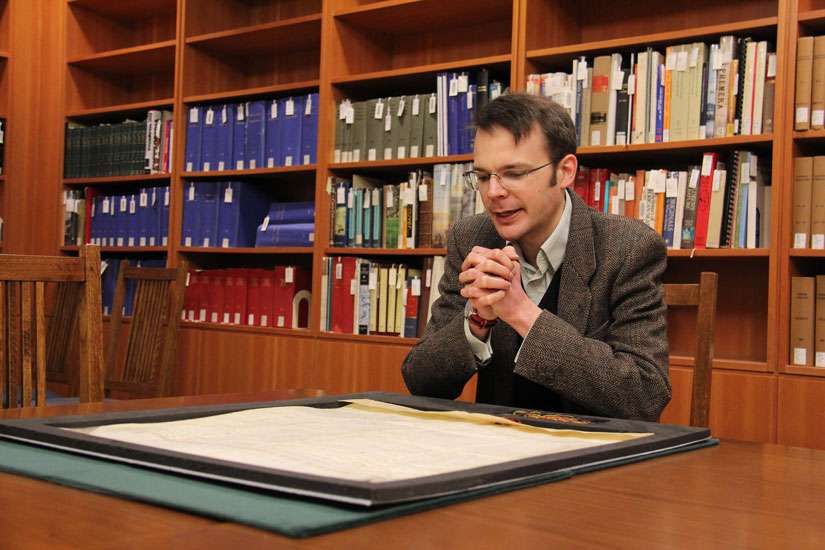“Students have something they can smell, touch, feel, read if they read Latin — which few of them can — that survives to us from the 13th century,” said history professor Richard Pollard, who urged the school’s library to buy the document.
He said Pope Innocent IV, as well as 13 cardinals, including future Pope Nicholas III, issued it at the First Council of Lyons in 1245.
The papal bull, which measures 62 cm by 56 cm, was written with a quill on sheepskin or calfskin. It was a legal document guaranteeing the rights and privileges of the St. Michael Poor Clare monastery in Trent, Italy.
The decree was sealed with ribbon and a “bull”: a lead seal with the pope’s name on one side and images of Sts. Peter and Paul on the other, as proof it was authentic.
“In this bull, Innocent IV guarantees all the rights and privileges of this monastery. He says, ‘if anyone messes around with you, they have to answer to me.’ ”
It was issued in the midst of a heated conflict between Pope Innocent IV and Roman emperor Frederick II over who controlled Italy. The pope called 150 bishops and others to Lyons to excommunicate and depose the ruler. Three days later, they wrote the medieval artifact students are poring over.
“Through the privilege of the present document we confirm and guarantee every liberty and immunity granted to your monastery by our predecessors,” the translation says.
If someone knowingly tramples the nuns’ rights, “let him lose the dignity of his power and honour, and let him know that he stands guilty before divine judgment for the iniquity perpetrated.”
Pollard said the document was kept folded, likely in a drawer, at the monastery until the early 19th century. The monastery was dissolved, and its libraries and archives ended up on the open market. The papal bull landed in England, where it stayed until UBC bought it for $15,000.
Conservator Anne Lama dusted it clean, tested the ink and flattened the parchment, which had been folded for centuries, in a monitored humidity chamber.
“As soon as the environment goes wrong, the document will react and will start to wave, shrink or be mouldy.”
It is stored in a humidity-controlled vault and retrieved during lessons on medieval history. Katherine Kalsbeek, the acting head of rare books and special collections, said there is a protective sheet over the document so students won’t touch it directly.
“This sort of environment ensures that documents like the papal bull will be around for a long time.”
(B.C. Catholic)


